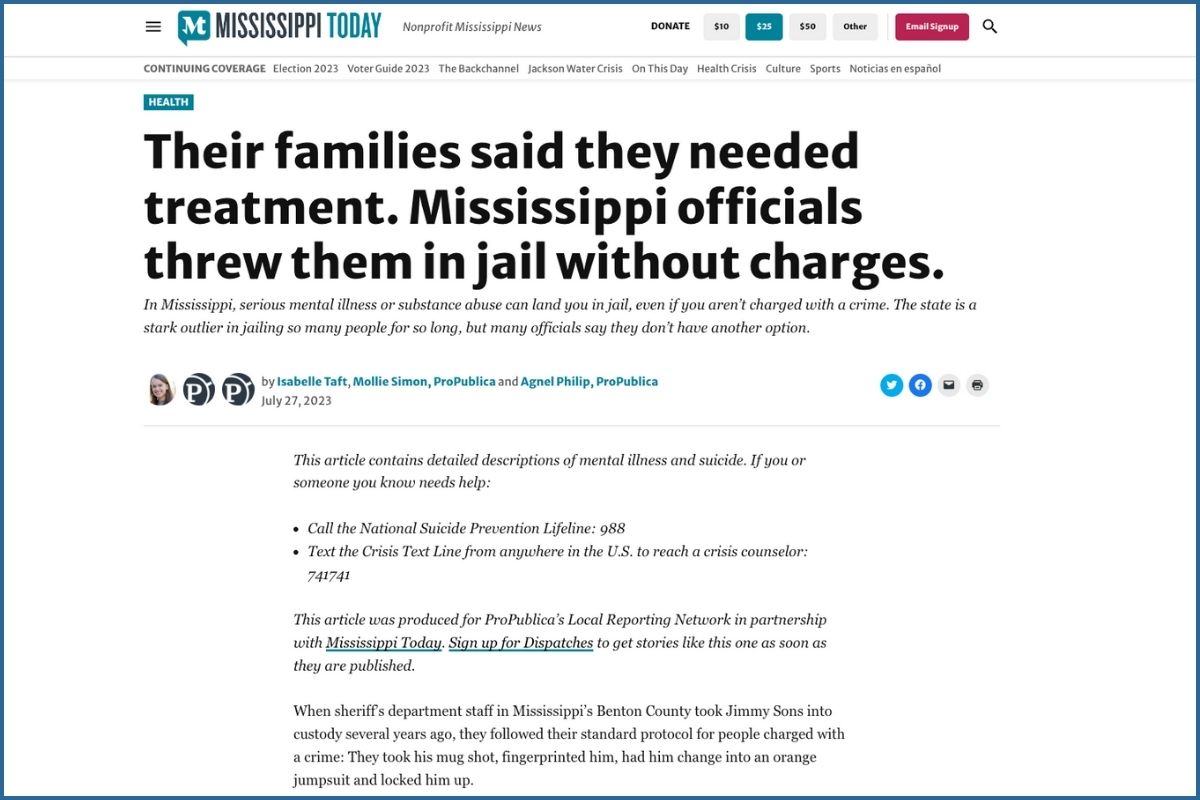Last week, Mississippi Today published two articles: “Their families said they needed treatment. Mississippi officials threw them in jail without charges,” and “Mississippi remains an outlier in jailing people with serious mental illness without charges.” These articles assert that Mississippi frequently jails people awaiting mental health treatment simply because there are no beds, a practice outlawed in some states and a rare occurrence in the remaining ones.
The first article describes the experience of 20-year-old Jimmy Sons:
“When sheriff’s department staff in Mississippi’s Benton County took Jimmy Sons into custody several years ago, they followed their standard protocol for people charged with a crime: They took his mug shot, fingerprinted him, had him change into an orange jumpsuit and locked him up.
But Sons, who was then 20 years old, had not been charged with a crime. Earlier that day, his father, James Sons, had gone to a county office to ask that his youngest son be taken in for a mental evaluation and treatment. Jimmy Sons had threatened to hurt family members and himself, and his father had come across him sitting on his bed with a loaded shotgun.
On Sons’ booking form, in the spot where jailers usually record criminal charges, was a single word: ‘LUNACY.’
……Jimmy Sons didn’t receive a mental evaluation when he was booked into the Benton County jail in September 2015, according to documents in a lawsuit his father later filed. Less than 24 hours later, he was dead. Left alone in a cell without regular visits by jail staff, he had hanged himself.
He had been back in Mississippi for just a few days, planning to join his dad in electrical work, said his mother, Juli Murray. He had set out from her home in Bradenton, Florida, so early in the morning that he didn’t say goodbye.”
The article says that since 2006 thirteen people have died in Mississippi jails waiting for mental health treatment. It also describes the experiences of others who have ended up in jail simply because they needed mental health care and what they and their families went through.
State leaders expressed alarm and concern:
- “We’re not a mental health hospital. We’re not even a mental health Band-Aid station. That’s not what we do. So they should never, ever see the inside of my jail.” Greg Pollan, president of the Mississippi Sheriffs’ Association and sheriff of Calhoun County
- Some county officials say that keeping people out of jail during the process requires the state to step up. State Rep. Jansen Owen, a Republican from Pearl River County in southern Mississippi who represents people during the commitment process, said he believes counties that spend “millions of dollars on fairgrounds and ballparks” could find alternatives to jail. But he also sees a need for more state-funded facilities. “You can’t just throw it on the counties,” he said. “It’s a state prerogative. And them being held in the jail, I think, is a result of the state kicking the can down the road to the counties.”
- Wendy Bailey, head of the state Department of Mental Health, said it’s “unacceptable” to jail people simply because they may need behavioral health treatment. Department staff members have met with chancery clerks around the state to urge them to steer families away from commitment proceedings and toward outpatient services offered by community mental health centers whenever possible. The Department of Mental Health says it prioritizes people waiting in jail when making admissions to state hospitals. The state has expanded the number of crisis unit beds from 128 in 2018 to 180 today, with plans to add more. And it has recently increased funding for local services to reduce commitments.
- But Bailey said the department has no authority to force counties to change course nor legal responsibility for people going through the commitment process until a judge orders them into treatment at a state psychiatric hospital.
Yet despite this alarm and concern, no one took responsibility for the situation. This situation has resulted in 13 people dying in jail while waiting for help.
We at Families as Allies have repeatedly pointed out that Mississippi has no overarching infrastructure to coordinate the different parts of the state mental health system and no state authority charged with doing so. Other states do. There is likely a relationship between states with an accountable mental health infrastructure and those not jailing people— some of whom die—simply because they need mental health help. It is beyond time for Mississippi to get to the bottom of this issue and address it.

